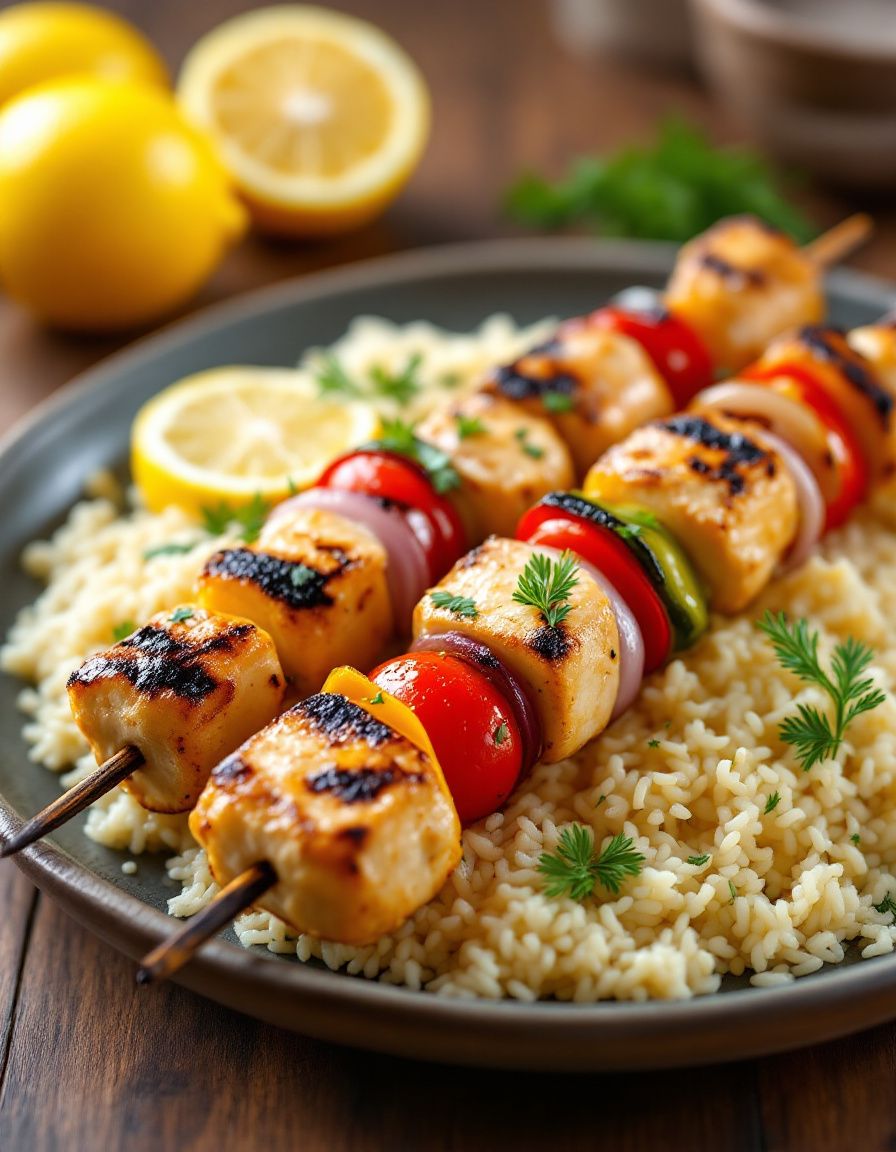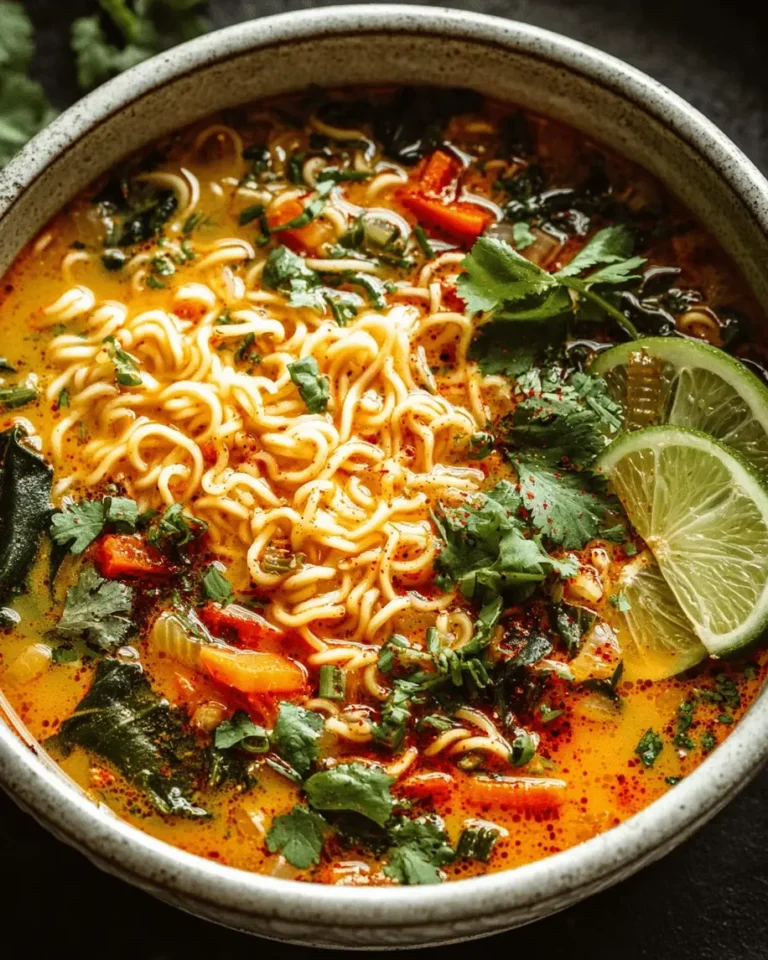Easy Greek Chicken Skewers with Lemon Rice – Ready in 30 Minutes

Greek Chicken Skewers with Lemon Rice – Easy & Flavorful!
Greek Chicken Skewers with Lemon Rice is a dish that transports you straight to the sun-drenched shores of Greece. With tender, marinated chicken threaded onto skewers and grilled to juicy perfection, these skewers are paired with fragrant lemon rice that adds the perfect tangy counterpart to the savory goodness of the chicken. This easy and flavorful recipe not only brings vibrant Mediterranean flavors to your dinner table but also embodies a wholesome approach to cooking with both freshness and simplicity.
Imagine the sizzle of marinated chicken over high heat, releasing irresistible aromas that beckon everyone to the table. Each bite offers layers of flavor, from the zesty marinade to the fluffy rice, making it a delightful choice for family meals, backyard barbecues, or impressing guests at a casual get-together. The bright acidity of lemon brightens the dish, enhancing every savory note while keeping the meal light and refreshing.
Quick Recipe Highlights
- Flavor Profile: The marinade combines olive oil, lemon juice, garlic, and herbs, creating a rich and zesty flavor spectrum.
- Texture: The chicken skewers are juicy and tender, while the lemon rice provides a fluffy and slightly chewy contrast.
- Aroma: Grilling the skewers releases a mouthwatering scent of smokiness and fresh herbs, invigorating any meal setting.
- Visual Appeal: With vibrant colors from the lemon, herbs, and the golden-brown chicken, this dish makes for an eye-catching presentation.
- Skill Level Needed: This recipe is beginner-friendly, requiring basic grilling and rice cooking skills.
- Special Equipment: You will need skewers (metal or soaked wooden), a grill or grill pan, and a pot for cooking rice.
Recipe Overview
- Difficulty Level: This recipe is classified as easy, making it an ideal choice for novice cooks looking to impress.
- Category: Perfect for lunch or dinner, it can also serve as a main dish during a festive gathering.
- Cuisine: This dish celebrates Greek culinary traditions, known for their use of fresh ingredients, bold flavors, and simple techniques.
- Cost: The ingredients are affordable and widely available, making it easy to prepare for everyday meals.
- Season: Best enjoyed during the warm months when grilling is most popular, but it can be made year-round.
- Occasion: Whether it’s a family dinner, a summer barbecue, or a casual gathering, this dish is always a hit.
Why You’ll Love This Recipe
This Greek Chicken Skewers with Lemon Rice recipe will captivate your taste buds with its delightful blend of flavors and textures. The perfectly marinated chicken delivers a punch of flavor that is juicy and tender, while the lemon rice provides a zesty contrast that brightens every bite. This harmony of flavors not only pleases the palate but also elevates the overall dining experience.
Convenience is another reason to love this recipe. With just 30 minutes from prep to table, it’s perfect for busy weeknights or spontaneous gatherings. The straightforward ingredients mean you won’t be hunting for exotic elements in specialty stores, plus the simplicity of grilling chicken skewers can be an engaging, social cooking experience.
Packed with nutritional benefits, this dish features chicken as a lean protein source and lemon rice boasts vitamins and minerals. The use of olive oil not only adds flavor but also contributes healthy fats, making it a nourishing choice for a balanced meal.
This dish is perfect for social and entertaining settings. Serve the skewers and rice family-style, letting guests help themselves. It encourages interaction and sharing, adding a festive atmosphere to any occasion. It creates a delightful conversation starter and adds a fun flair to gatherings.
Cost-effectiveness is yet another selling point. The primary ingredients are affordable, making it a budget-friendly option for families and entertaining alike. Plus, with potential for leftovers, it can provide delicious meals later in the week, maximizing your culinary investment.
Historical Background and Cultural Significance
Greek cuisine is steeped in history, with roots tracing back thousands of years. It reflects the diverse cultures that influenced the region, including the Romans, Ottomans, and Venetians. The flavor profiles and cooking techniques have evolved, yet traditional recipes such as chicken skewers remain popular due to their simplicity and robustness.
Skewered meats have a long-standing culinary tradition in Greece, as they are often cooked at festivals and celebrations. The act of grilling embodies a connection to the land and community, making it a cherished way to enjoy meals outdoors, especially during warm months when families gather.
Over time, variations of chicken skewers have spread across cultures and cuisines. Whether known as souvlaki in Greece or kebabs in other regions, these flavorful bites carry with them stories of the people and traditions that created them. Every culinary interpretation reflects cultural heritage and communal ties.
Regional variations also play a significant role in this dish’s appeal. In different parts of Greece, local herbs or spices may be used, reflecting the diverse agricultural landscapes. This adaptability has allowed the dish to flourish across various tables, each adding a unique twist that can be appreciated by many.
Ingredient Deep Dive
Chicken is the star of this recipe, providing a lean source of protein essential for a balanced diet. Historically significant in Greek culture, chicken has been a staple meat for centuries. Nutritionally, it’s rich in B vitamins, iron, and selenium. When selecting chicken, look for pieces with firm texture and a pink hue. Proper storage involves refrigeration and can last a few days; freezing is also an option for long-term preservation.
Olive oil is another key ingredient, an iconic element of Mediterranean diets known for its heart-healthy monounsaturated fats. Its rich history in Greece dates back to ancient times, serving both culinary and medicinal purposes. When purchasing olive oil, seek extra virgin quality for the best flavor. Store it in a cool, dark place to maintain purity and nutritional integrity.
Lemons play a significant role in brightening the flavors of this dish. They are deeply rooted in Mediterranean culture, symbolizing longevity and health. Rich in vitamin C, they provide antioxidant properties that contribute to overall wellness. When picking lemons, look for firm fruit with a vibrant yellow hue. Store uncut lemons at room temperature or refrigerate for extended freshness.
Garlic adds not just flavor but also cultural significance, revered in various cuisines for its health benefits. Garlic is known for its antibacterial properties and is believed to enhance immunity. When choosing garlic, select bulbs that are firm and dry. Store in a cool, dry place, ideally on a countertop.
Herbs like oregano and dill are vital for creating the dish’s aromatic profile. These herbs have been utilized in Greek cooking for centuries, each offering unique flavors and health benefits. When selecting herbs, fresh is always preferred for potency. Store fresh herbs in the refrigerator or freeze them for future use. Dried herbs should be kept in a cool, dark cabinet to maintain flavor.
Common Mistakes to Avoid
- Overmarinating Chicken: Marinating for too long can lead to overly mushy texture. A few hours is sufficient for maximum flavor without compromising texture.
- Ignoring Skewer Soaking: If using wooden skewers, soaking them in water prevents burning on the grill. Aim for at least 30 minutes before grilling.
- Skipping Preheating: Failing to preheat the grill can lead to sticking and uneven cooking. Make sure it’s hot for perfect searing.
- Using Cold Ingredients: Bringing chicken to room temperature before grilling ensures even cooking. Cold pieces can result in a rough texture.
- Undercooking or Overcooking: Use a meat thermometer to ensure chicken is perfectly cooked. Aim for an internal temperature of 165°F (75°C).
- Piling Ingredients: Overcrowding the skewers can lead to uneven cooking. Ensure space between pieces for optimal heat circulation.
- Not Tasting Rice: Always taste the rice toward the end of cooking to adjust the seasoning to your preference.
- Skipping Lemon Zest: For extra flavor in the rice, include lemon zest. It amplifies the citrus notes and elevates the dish.
Essential Techniques
Marinating is a key process that helps infuse flavor into the chicken, breaking down tougher muscle fibers for tenderness. To master it, allow adequate time by marinating in the refrigerator for a minimum of one hour. Be cautious not to over-marinate, as that can compromise texture leading to mushy meat. The aromatics should be thoroughly mixed to ensure even distribution of flavor.
Skewering requires careful attention to ensure uniform cooking and presentation. To master this technique, alternate between chicken and vegetables for color and flavor. Maintain even spacing on the skewer to allow proper heat circulation. Avoid packing too tightly to allow the chicken to brown adequately.
Grilling is crucial for this dish, offering a unique smoky flavor profile. Master the timing by monitoring the chicken; flipping halfway allows for even cooking. Different grills will have varying heat levels, so it’s essential to adjust timing according to your equipment. Look for visual cues of golden-brown edges to indicate readiness.
Cooking rice properly transforms it from a simple side to a welcome addition. Rinsing the rice beforehand removes excess starch, leading to light, fluffy results. Always start with the right water-to-rice ratio, usually 2:1. Use a pot with a tight-fitting lid and avoid lifting it during cooking to trap steam.
Pro Tips for Perfect Greek Chicken Skewers with Lemon Rice
Start with high-quality, fresh ingredients to maximize flavor. Fresh herbs and seasonal produce can elevate the dish significantly. Always taste for seasoning before serving, as flavors can vary widely depending on ingredients.
If marinating, consider doing it overnight for enhanced flavor penetration. Aim for a balance of herbs and citrus in the marinade. Adjust salt levels to avoid overpowering the dish; remember, you can always add salt but can’t take it away.
Grill over medium-high heat to achieve perfect charring without burning. Ensure your grill surface is clean before cooking to prevent sticking and flare-ups. Keep a spray bottle of water handy to tame flames if needed.
Pair the skewers with a variety of side dishes such as tzatziki or a Greek salad to offer contrast. Presentation matters; serve skewers on a colorful platter garnished with fresh herbs and lemon wedges for visual appeal.
Use leftover chicken in salads or wraps for quick meals throughout the week. The lemon rice can easily be reheated and served with other proteins, allowing for easy meal prep.
Finally, invite friends over for a cookout! Cooking together enhances the experience, making it more enjoyable and memorable.
Variations and Adaptations
Regional variations exist based on local ingredients, with some areas favoring different herbs or spices. In Crete, for instance, Cretan spices add unique depth to the marinade. Other regional adaptations include the addition of seasonal vegetables such as bell peppers and cherry tomatoes on the skewers.
For seasonal adaptations, consider adding grilled zucchini or asparagus during spring and summer months. In the fall, butternut squash can also be a lovely addition, providing warmth and sweetness. Winter recipes can include heartier grains alongside the lemon rice, such as quinoa or farro.
Dietary modifications can easily be incorporated. For a gluten-free version, ensure all condiments are gluten-free certified. If avoiding carbs, replace rice with cauliflower rice, infused with lemon to maintain the essence of the dish.
Flavor variations can be explored by experimenting with different marinades. Adding spices such as cumin or coriander elevates the flavor profile to regional cuisines. A spicy marinade with harissa or chipotle can add a kick for spicy food lovers.
Texture modifications can be achieved by changing the method of cooking. Baking the skewers or pan-frying for a crispy finish provides different textures for variety. Presentation alternatives include serving the skewers over a bed of rice or in pita bread as a sandwich.
Serving and Presentation Guide
For an appealing presentation, serve the chicken skewers on a large platter with a sprinkle of fresh parsley or dill. Accompany with citrus wedges to enhance the visual elements while providing freshness. For added texture, consider contrasting colors by adding grilled vegetables on the side.
Garnishing with feta cheese crumbles can enrich the Mediterranean flavor while adding visual interest. Drizzle a lemon vinaigrette as an accent on the rice before serving for added flavor.
Traditional accompaniments like tzatziki sauce serve dual purposes—bringing creamy texture while helping to round out flavors. You can also build a beautiful mezze platter featuring the skewers, rice, and dips to encourage sharing and conversation.
Modern serving suggestions might include skewers individually placed into single-serving cups for a fun twist. This playful approach is perfect for gatherings, allowing guests to easily grab and enjoy their portion without fuss.
Temperature considerations are important. Chicken should be served hot, while lemon rice can be served warm or at room temperature. Use warming trays if needed for gatherings to keep everything at optimal serving temperatures.
Practice portion control for healthier servings. Using small bowls, each guest can create their own plates, allowing for some dishes to be more generous—ensuring a delightful dining experience for everyone.
Wine and Beverage Pairing
Pairing this dish with the right beverage elevates the meal. A light, crisp white wine like Sauvignon Blanc or Assyrtiko perfectly complements the lemony chicken, enhancing the dish’s refreshing qualities. The wine’s acidity pairs well with the tangy flavors, making it a harmonious choice.
For non-alcoholic options, fresh lemonade or sparkling water infused with mint and lemon offers a refreshing counterpart to the meal. Iced tea with a hint of lemon complements the flavors beautifully while keeping the experience light and lively.
If pairing coffee or tea, a herbal tea with mint creates a soothing finish after meals, aligning nicely with the Mediterranean theme. Serve coffee lightly sweetened to balance the zestiness of lemon and spices used in the dish.
Remember to serve your beverages chilled, as the refreshing drinks enhance the vibrant flavors of the skewers and rice. Always consider guest preferences, offering a variety of choices to ensure everyone finds something they enjoy.
Storage and Shelf Life
Proper storage methods for leftovers are key to maintaining flavor and freshness. Cool the chicken skewers promptly and store them in airtight containers in the refrigerator. They last up to four days when stored correctly, allowing for easy reheat later.
Temperature requirements are crucial to avoid spoilage. Chicken should be reheated to an internal temperature of 165°F (75°C) for safe consumption. Use the microwave or oven for heating, ensuring even warmth throughout the meat.
Containers should be food-safe and ideally glass or BPA-free plastic. Avoid storing in metal containers, which can react with acidic ingredients like lemon. Label containers with dates to keep track of freshness.
Signs of spoilage include off smells, discoloration, or an unusual texture. Discard anything suspicious to avoid foodborne illnesses. Reheating should be done gently to preserve moisture, preventing dry chicken.
Freezing guidelines allow the dish to maintain quality for longer. Wrap chicken skewers tightly in plastic wrap, followed by aluminum foil or store in freezer-safe bags for up to three months. For lemon rice, utilize freezer-safe containers, ensuring to remove excess air.
Make Ahead Strategies
Preparation time is reduced significantly by implementing make-ahead strategies. Marinate chicken up to 24 hours before grilling for the most flavorful result, and store in the refrigerator for maximum taste.
Rice can also be cooked ahead of time, allowing it to cool before refrigerating. Reheat with a sprinkle of lemon juice for refreshing flavor. If serving for a gathering, prepare rice a few hours in advance to minimize stress.
Assembly tips include keeping grilled skewers warm in the oven until ready to serve. Also, consider prepping side dishes, like salads, in advance to complement the main dish. This approach allows you to focus on grilling and finishing touches when meal time arrives.
When reheating, avoid exposing leftovers to high heat for long periods. Gentle reheating methods will keep the chicken succulent. Add fresh herbs or lemon zest just before serving to brighten the dish again.
Fresh element additions at the time of service enhance flavors. Include a side of fresh cucumber salad or simple greens tossed with olive oil and vinegar. These components add crunch and elevates the meal experience, offering balanced flavors.
Scaling Instructions
Scaling this Greek Chicken Skewers with Lemon Rice recipe is easy. For half the recipe, simply divide ingredient measurements in half and adjust cooking times as necessary without losing flavor.
Doubling or tripling the recipe is equally straightforward, though you may need extra skewers or a larger grilling surface. You will also want to monitor the cooking time, as larger quantities can take longer.
Equipment adjustments may be required based on portion sizes. If you lack sufficient grill space, consider cooking in batches or using an oven instead for larger quantities.
Timing modifications are essential, as larger batches often take longer to cook evenly. Use a meat thermometer to properly gauge doneness and adjust cooking time accordingly, especially for thicker skewers.
Finally, remember storage considerations when scaling up. Ensure that all leftovers are stored appropriately, following guidelines for freshness and safety outlined above.
Nutritional Deep Dive
This delicious recipe provides a balanced macro breakdown. Each serving contains a healthy dose of protein from the chicken, significant carbohydrates from the lemon rice, and beneficial fats from olive oil. This combination supports muscle growth, energy levels, and overall wellness.
Micronutrient analysis reveals the richness of vitamins and minerals, primarily through the lemon and herbs. Vitamin C in lemons promotes a healthy immune system while B vitamins from chicken contribute to energy metabolism.
Health benefits extend beyond nourishment, as the Mediterranean principles embodied in this recipe offer anti-inflammatory properties. Ingredients like olive oil and herbs are known to promote heart health, making it a great choice for overall wellbeing.
Dietary considerations for this meal allow for easy modifications. Nutritional needs can be catered to varying diets, such as incorporating more vegetables or replacing rice with whole grains for added fiber.
Portion analysis encourages mindful eating. While delicious, stay within recommended serving sizes to manage caloric intake effectively. This meal’s balance makes it suitable for those aiming for weight management without sacrificing taste.
Dietary Adaptations
This recipe can easily adapt for those following a gluten-free diet. As long as all marinades and additional sauces are free of gluten, you can enjoy this dish without concerns, making it accessible for all.
For a dairy-free version, simply omit any cheese garnishes and stick to the fresh ingredients. The flavors come from the lemon and herbs, ensuring you won’t miss out on taste.
Vegans can enjoy the core flavors by substituting chicken with grilled tofu or mushrooms marinated to mimic the traditional flavors. This allows for an equally tasty but plant-based version that maintains the essence of the dish.
Low-carb modifications can replace rice with cauliflower rice, which can be easily sautéed with lemon juice for similar tastes. This provides the flavor without the excess carbohydrates typically found in rice.
Keto dieters can align with this recipe by leveraging ingredients rich in healthy fats, such as avocado served alongside the skewers for added nutrients and fullness. While keeping carbs low, you can still enjoy this flavor-packed dish.
Other specific diets can also benefit, such as paleo, with adjustments ensuring it remains compliant with whole food principles. Always tweak the recipe to match nutritional values while preserving the delightful experience of the meal.
Troubleshooting Guide
Texture issues may occur if chicken is overcooked. The solution is to monitor the grilling process closely, use a meat thermometer, and remove chicken once it reaches 165°F (75°C) for juicy, tender meat.
Flavor balance can sometimes lean towards too much acidity. To remedy this, add a pinch of sugar or honey to the lemon rice while cooking to balance the tanginess with sweetness without overpowering it.
Temperature problems can arise if the grill is not hot enough. Ensure it’s preheated adequately before placing skewers on the grill, creating an ideal sear and preventing sticking.
Equipment challenges may involve flare-ups or uneven cooking. Adjust the grill’s heat settings, and consider moving skewers around regularly to achieve even doneness.
Ingredient substitutions can alter your dish’s taste significantly. If you’re out of olive oil, opt for lighter vegetable oils, but be mindful of the impact on flavor. Stick to similar oils for the best results.
Timing concerns often arise during gatherings. To manage this, prep as much as possible ahead of time and consider cooking in batches to ensure all dishes are served warm together.
Recipe Success Stories
Community feedback on Greek Chicken Skewers with Lemon Rice often highlights its versatility and flavor notes. Home cooks have shared their love for how it brings family together, from gatherings to simple weeknight dinners.
Variation successes reflect how flexibility in this dish allows for individual creativity. Many have found joy in experimenting with marinades or adding seasonal vegetables, making it their own while still embracing the core recipe.
Adaptation stories reveal just how accessible this dish is. Readers regularly mention making vegan versions or gluten-free adaptations, showcasing how these recipes can connect diverse dietary needs.
Photography tips suggest colorful garnishes and fresh ingredients elevate the dish’s visual appeal, making it more inviting on social media. Utilize natural light for the best results, showcasing bright lemons and vibrant herbs.
Recipe reviews often emphasize ease and flavor, perfect for all cooking levels. Many families find themselves returning to this dish frequently, enjoying each experience around the kitchen together.
Frequently Asked Questions
Can I use different types of meat for skewers?
Absolutely! While chicken is traditional, you can use beef, pork, or seafood. Adjust marinating times accordingly for best results.
How do I ensure juicy chicken?
Marinate the chicken for at least one hour to ensure flavor and moisture retention. Avoid overcooking by monitoring temperature closely.
Can I make this recipe in the oven?
Definitely! Preheat your oven to 400°F (200°C) and bake for 20-25 minutes, flipping halfway, until the chicken is cooked through.
What should I serve with the skewers?
Side options include Greek salads, tzatziki sauce, or grilled pita bread for a comprehensive meal reflecting Mediterranean flavors.
Can I use frozen chicken?
Yes, but it should be thawed completely prior to marinading and cooking for best flavor and texture. Avoid cooking from frozen.
How long can leftovers be stored?
Cooked chicken can be stored in the refrigerator for up to 4 days. Reheat thoroughly, aiming to reach an internal temperature of 165°F.
Is it possible to grill without skewers?
Yes! You can grill chicken pieces directly on the grill or use a grilling basket for grilling without skewers.
What other herbs can I use in the marinade?
Feel free to experiment with herbs like thyme, basil, or rosemary. Each adds unique flavors that can enhance your dish.
Can I prepare the marinade ahead of time?
Yes! You can prepare the marinade a day in advance and store it in the refrigerator. Just add chicken when ready to cook.
Are there vegetarian options?
Yes! Substitute chicken with tofu, tempeh, or vegetables like bell peppers and mushrooms to create delicious skewers.
Additional Resources
For more delightful Mediterranean recipes, check out our selection of Greek appetizers, vibrant salads, and healthy grain bowls. Each offers a unique approach to utilizing fresh and flavorful ingredients.
Explore technique guides for grilling, marinating, and preparing sides to complement Greek dishes, enhancing your overall culinary skillset in the kitchen.
Gain ingredient information on fresh herbs and their flavorful functions, providing insight into how to elevate your dishes with bright, aromatic notes.
Consider investing in quality kitchen equipment like skewers, grill pans, and marinade containers. Simple tools can elevate your cooking experience, making it easier to create stunning meals.
Look out for seasonal variations that highlight regional ingredients, creating opportunities for freshness and variety in your meals. This engaging approach encourages creativity while celebrating culinary traditions.
Join the Conversation
Engage with our community by sharing your experiences with Greek Chicken Skewers with Lemon Rice on social media. We’d love to see your delightful culinary creations!
Remember to capture high-quality photos of your finished dishes. Natural lighting and vibrant garnishes bring out the beauty of your meals, enticing others to join in.
Leave recipe reviews and feedback to help others discover this delicious dish. Your experiences and suggestions can inspire others to try their hands at this recipe.
Participate in forums and cooking groups, sharing variations, tips, and creative uses for leftovers. Connecting with fellow food enthusiasts enriches the cooking journey.
Feel free to experiment with your own variations! Whether it’s a unique marinade or a fresh side dish, add your personal touch to this beloved recipe. Your creativity can inspire others to explore new culinary ventures!
The Recipe
Greek Chicken Skewers with Lemon Rice
Serves: 4 servings
Prep Time: 15 mins
Cook Time: 15 mins
Total Time: 30 mins
Kitchen Equipment Needed
- Grill or grill pan
- Metal or soaked wooden skewers
- Mixing bowls
- Meat thermometer
- Pot for cooking rice
Ingredients
- 1 lb chicken breast, cut into 1-inch cubes
- 2 tablespoons olive oil
- Juice from 2 lemons
- 2 cloves garlic, minced
- 1 tablespoon dried oregano
- Salt and pepper to taste
- 1 cup rice (basmati or long-grain)
- 2 cups chicken broth or water
- Fresh parsley, for garnish
- Lemon wedges, for serving
Directions
- In a mixing bowl, combine olive oil, lemon juice, garlic, oregano, salt, and pepper. Add chicken pieces and marinate for at least 1 hour.
- While the chicken marinates, rinse the rice under cold water until water runs clear. In a pot, combine rice and chicken broth, bringing it to a boil. Reduce heat, cover, and simmer for about 15-20 minutes.
- Preheat the grill to medium-high heat. Thread marinated chicken onto skewers, leaving space between each piece.
- Grill skewers for about 10-15 minutes, turning occasionally until chicken is cooked through and has nice grill marks.
- Once rice is ready, fluff it with a fork and add a bit of lemon juice.
- Serve the chicken skewers over lemon rice, garnishing with fresh parsley and lemon wedges on the side.
Recipe Notes
- For extra zest, add lemon zest to the marinade.
- Vegetarians can substitute chicken with hearty vegetables or tofu.
- Leftover chicken can be added to salads or wraps for quick meals.
- Feel free to incorporate seasonal vegetables into the skewers.






